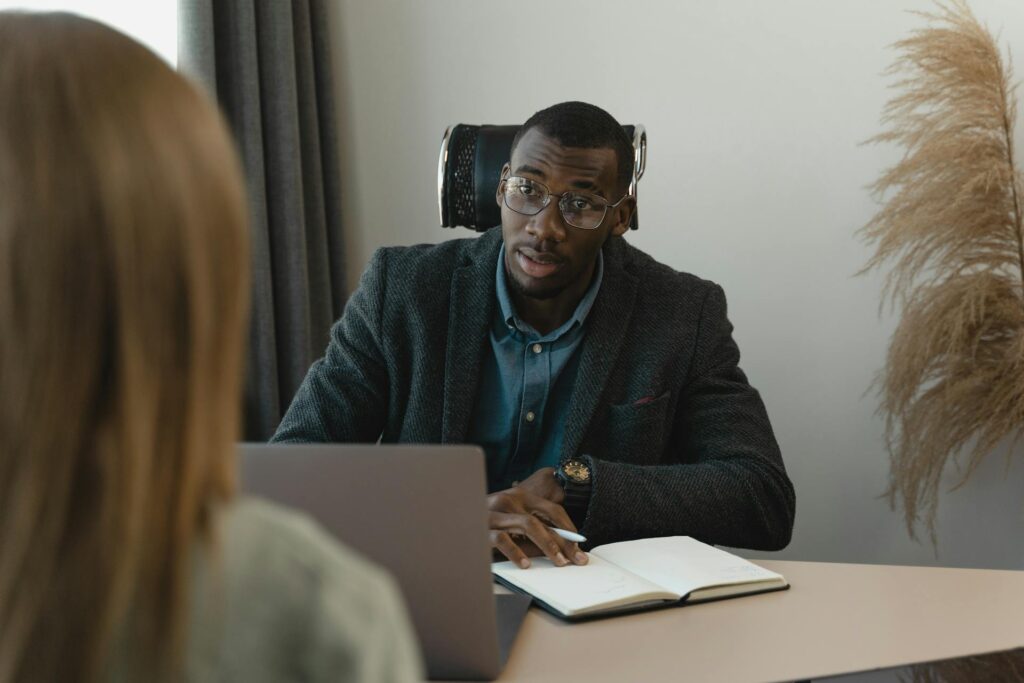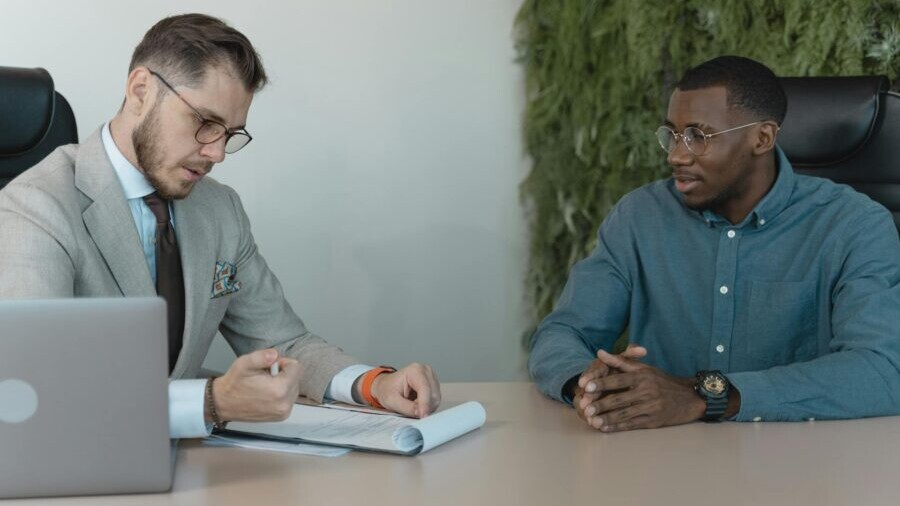Investigation interviews can reveal a lot about the issues the workplace is facing. Knowing how to conduct them in a way that encourages individuals to share more information and help establish credibility plays an important role in the success of the investigation. Body language, question development as well follow-up questions and facial expressions can all contribute to an effective investigation interview. When choosing the right investigator to look into a problem, it is necessary that they have the right skills for conducting a well-organised investigation interview.
The required skills for a successful investigation interview
A great investigation interview will require the investigator to have certain skills that will make the process as easy as possible. Some of the main ones are:
Organised: Investigators will need to gather as much evidence for the interviews as possible before the process starts. This will enable them to understand the case, what they are looking to get out of the investigation, and what the right questions to ask are.
Adaptable: Many times, as more evidence comes to light, the investigator will need to change their approach to get more information out of the interview. They will need to change their tone of voice and their demeanour so they do not sound or seem accusatory as they are trying to build rapport and establish credibility.
Impartial: During the whole process, investigators need to focus on the facts rather than their own personal beliefs and assumptions. Even if a situation looks like it is leaning a certain way, if the evidence does not clearly point that way, then they need to reconsider. They should avoid the creation of a hypothesis as it may lead to confirmation bias and investigators tunnel visioning towards a specific outcome.
Open-minded: An effective investigation interview will allow all individuals to say their piece without interrupting them or trying to finish their sentences. This also means that the investigators need to keep an open mind and take the process one step at a time. They might receive new information, ideas and opinions that may not match what they have previously dealt with. Investigators will also need to be empathetic and conscious of other people’s feelings without letting those feelings lead the investigation.
Active listener: Without active listening, the investigator will not be able to formulate good follow-up questions. Apart from taking notes, investigators should try to maintain some eye contact, give brief acknowledgements such as ‘mhm, right, got it’ and nod to show that they are paying attention. People do not like talking to an individual who is not showing interest in what they have to say.
Preparing for the investigation interview
Every investigation interview needs a plan that will outline:
- Who will be interviewed
- Location of the interview
- Who will interview them
- Date and time
- Questions that will be asked
- The goal of the interview
Each element of the interview plan can help the investigator achieve an ideal outcome. The investigator will need to decide the order in which the investigation interviews will take place. They will also need to find a place with low foot traffic that is quiet, accessible and comfortable for all individuals. If an investigation team is employed by the company, the team will need to decide who will be interviewing whom. This is especially important if certain investigators are stronger at obtaining information than others and if the organisation is dealing in a delicate manner.
Investigators should give the individual the choice of when they want to be interviewed so they feel like their input matters. After the time and place have been decided, the next step is to develop the right questions. When creating the questions, the goal of the interview should be taken into account. They should be split into categories such as background questions, rapport building, credibility building, fact-checking, and time and place.
The best way to carry out the investigation interview is by:
- Using the right body language and facial expressions: Appearing neutral, sympathetic, understanding and non-judgemental will help to build rapport with the individual
- Controlling tone of voice: Some scenarios may require a stern tone of voice while others will require a softer one.
- Having the right mix or open and close-ended questions: While open-ended questions are usually preferred to gather as much information as possible, a large amount of them can be tiring. Close-ended questions can be used when the interviewer is looking for a yes or no answer.
- Probing but not leading: The investigator is obviously trying to lead the interview in a certain direction, but they should avoid questions that may already provide an answer. For example, ‘you did it, didn’t you?’, is already giving a potential answer. It is better to ask questions that make it seem like the interviewee is leading the process.
Conducting the investigation interview
The investigation interview can be very stressful for the interviewee. The interviewer will need to be compassionate, understanding, patient, and a great communicator. They will need to explain how the process will go and encourage them to take time to answer questions so they do not feel pressured if they need more time to remember. To make the investigation interview more comfortable, the interviewer should ask employees if they need water, if the room is too hot or cold and if they need a break. This will make them more relaxed and allow them to feel like they have some control over the situation.
During the investigation interview, the investigator should explain how important it is for them to be honest and assure them that they will not be judged in any way. The investigator is not there to play judge. They cannot prove anyone guilty or innocent, they are only there to complete the investigation and help the business move on to the next stage. They should refrain from using legal terminology such as theft, fraud or assault, especially if they are questioning the person who is being accused. It can discourage them from sharing more information as these labels carry negative connotations they might not want to be associated with.
Interviewees should know that the investigators are not there to take sides. They are there to gather the facts and build an accurate timeline of events. The interviewer should ask whether there are witnesses that can support their side of the story or further evidence that can give more insight into the incident.
As some investigations may need to take place online, Polonious provides investigators with our Simpletoconnect integration. This enables investigators to conduct secure interviews with anyone, anywhere while also providing them with a safe place to save their notes.

Post-interview and follow-ups
Investigation interviews may need more than one round. After the first round has been finalised, the investigators should reach out if they need to ask further questions and should run a similar process as the first interview. Scheduling at a time that suits everyone, choosing the same place if possible, but this time, with a different goal. Depending on what evidence the investigator has analysed, they might need to clarify some details, check whether there are any plausible explanations or try to probe for further evidence.
If they see that the interviewee is trying to evade the question, they should rephrase it or drive the interview away from the subject before mentioning it again. Investigators should leave the second interview without any confusion.
The investigators must remain respectful and document everything that was said in all interviews. When noting down their conversations, they should not include their personal assumptions or mention of irrelevant observations. For example, it should not be taken into consideration if the employee is anxious or avoiding eye contact. The investigation interview can make even innocent individuals act differently as they are dealing with a new and stressful situation, or the person may be hiding something irrelevant – e.g. in a fraud investigation and interviewee may be hiding an affair with a coworker that is unrelated to the fraud.
Effective interview notes only focus on what was said and how it relates to other pieces of evidence.
Improving your investigation interview
There are many elements that can affect how well an investigation interview goes. As long as investigators remain unbiased and willing to take a step back when they need to, they will be able to pinpoint areas for improvement. The investigators may also record the investigation interview so they can re-listen to answers and see if there are times when things could have gone differently.
If you are looking to take your investigation interview to the next level, consider a case management system. Polonious offers an easy way for investigators to carry out remote investigation interviews. Our simpletoconnect integration takes away the negative feelings individuals may get when trying to enter a meeting. All participants will receive a simple way to enter the interview and start the process in a professional manner.
This makes it easier to reach employees in different states and simplifies rapport building as staff do not feel flustered and confused. Moreover, by using Polonious, investigators will be able to store all their evidence and interview notes in one place. When working with a team, each party will receive progress updates on how the interview went and what information was obtained. This makes it easier for investigators to move to the next stage and keep a record of all questions they have already asked.
If you are looking to conduct a smoother investigation interview, reach out and we will be happy to show you how our system can help you.
How useful was this post?
Click on a star to rate it!
Average rating 0 / 5. Vote count: 0
No votes so far! Be the first to rate this post.
Let's Get Started
Interested in learning more about how Polonious can help?
Get a free consultation or demo with one of our experts
Eleftheria Papadopoulou
Eleftheria has completed a Bachelor's of Business with a major in Marketing at the University of Technology Sydney. As part of her undergraduate studies she also obtained a Diploma in Languages with a major in Japanese. Following her graduation she has been working as a Marketing Coordinator and Content and Social Media Specialist.
Eleftheria is currently finishing her Master in Digital Marketing.




